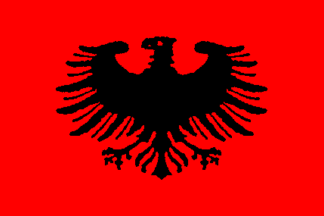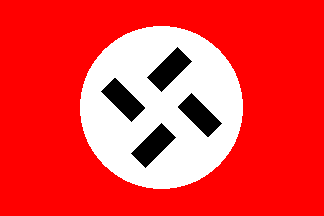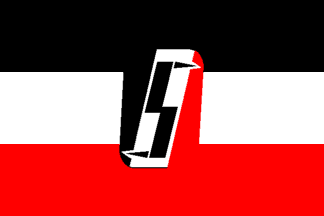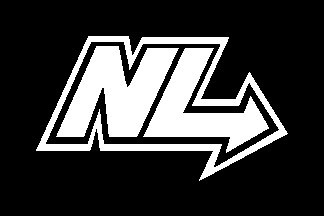![[Jack 1903-1919 (Germany)]](../images/d/de~1903j.gif) <>
<>![[Jack 1903-1919 (Germany), modern variant]](../images/d/de!1903j.gif) both by Marcus Schmöger
both by Marcus Schmöger
Imperial Jack 1903-1919 and modern variant

Last modified: 2008-01-26 by jarig bakker
Keywords: nationalsocialist | neonazi |
Links: FOTW homepage |
search |
disclaimer and copyright |
write us |
mirrors
![[All-Germanic Heathens' Front (Germany)]](../images/d/de}ahf.gif) image by A.H., 29 Oct 1999
image by A.H., 29 Oct 1999
I do not know very much about the AHF. They appear to combine the usual
elements of political nationalism and cultural racism. Curiously though,
they are vehemently anti-Christian, and want to restore the pre-Christian
religions of northern Europe. They are not exclusively German, but rather
Germanic. In addition to Germany, they have branches in Denmark, Iceland,
Norway, Sweden, Flanders, and the Netherlands. Note the strong resemblance
to the flag of the Hitler Jugend, with the
alghiz
rune in place of a swastika.
A.H., 29 Oct 1999
The alghiz rune was used in Germanic alphabet from 3rd to 13th
century, and had meaning of life and death, depending on which side was
up.
Željko Heimer, 30 Oct 1999
![[German Heathens' Front (Germany)]](../images/d/de}dhf1.gif) image by A.H., 29 Oct 1999
image by A.H., 29 Oct 1999
This is one of two flags shown on the website [which one?] for the specifically-German
branch of the Allgermanische Heidnische Front.
The central image is the Eye of Wotan (Woden, Odin, etc.). Like the AHF,
this flag also uses the algiz rune, in this case both upright and
reversed.
A.H., 29 Oct 1999
![[War Ensign 1903-1919 (Germany)]](../images/d/de-impwa.gif) 3:5 image by Carsten Linke
3:5 image by Carsten Linke
![[Jack 1903-1919 (Germany)]](../images/d/de~1903j.gif) <>
<>![[Jack 1903-1919 (Germany), modern variant]](../images/d/de!1903j.gif) both by Marcus Schmöger
both by Marcus Schmöger
Imperial Jack 1903-1919 and modern variant
The Reichskriegsflagge 1867-1919
is reported to be in use by German neonazi groups.
António Martins, 27 May 1998
The black-white-red colours of the German Empire
1871-1919 are prominently displayed [by the NPD
and other parties]. These colours are displayed in party conventions and
during demonstrations. NPD demonstrators wave
different versions of black-white-red:
- plain black-white-red,
- black-white-red with a black Iron Cross (essentially the Imperial
jack 1871-1919 and 1933-1935, also War
Ensign 1933-1935, above left),
- a variant of the latter flag with a slimmer Iron Cross (above right)
and
- black-white-red with black-red-gold in the canton (the German
Civil Ensign 1919-1933).
There are certainly other variants of black-white-red (historical or
not) that are produced by flagmakers for right extremists and used by them,
for example with inscriptions.
Marcus Schmöger, 14 Aug 2000
It is my understanding that in Germany today, in addition to Nazi
flags being banned, flags from the Kaiserreich
era are also banned, notably the German naval ensign.
Anonymous, 4 Feb 2001
Issue 11 (12th March 2001) of the German weekly news magazine Der
Spiegel, p. 76, showed this picture
of a Weimar Republic flag on display at the shop of NPD
party members in Ehringshausen (Hesse) - obviously because of the black-white-red
colours. It is the state ensign 1926-1933.
Marcus Schmöger, 19 Mar 2001
![[Unidentified Flag (Germany)]](../images/d/de}npdhs.gif) image by António Martins-Tuválkin, 26 Sep 2004
image by António Martins-Tuválkin, 26 Sep 2004
Marcus Schmöger reported a photograph in the German weekly news
magazine Der Spiegel, 2001, issue 1, p. 57, showing an NPD demonstration
(photograph scanned here).
There seems to be a flag at the bottom left of the picture, black field
with two crossed red "things" (most possibly swords) fimbriated in gold
(detail here).
Santiago Dotor, 26 Jan 2001
The same flag, plus one with a black-white-red canton, appears in this
photograph scanned by Marcus Schmöger from issue 13 (26th March
2001) of the German weekly news magazine Der Spiegel, p. 23, showing
an(other) NPD demonstration.
Santiago Dotor, 30 May 2001
This (...) black flag with a red hammer and sword crossing over each
other (...) is an official NPD flag (...).
Hermann von Condé, 6 Feb 2004
This unidentified flag is not a flag of the NPD.
Have in mind that demonstrations are not restricted to members of parties.
Maybe it is a flag of another organization, but not of the NPD.
Winfried Krauß, 8 Feb 2004
I came across the "Unidentified Flag" in the German Neo-Nazi Flag section.
In the picture shown, there is only a small portion of the flag which is
visible. I wanted to send an example of what the flag probably is. I don't
believe the flags actually belong to any certain organization.
BillyBoy, 23 Jul 2002
This flag: (hammer and sword/dagger crossed) refers to Otto Strasser's
movement: "schwarz Front" (black front). He created this political
group after leaving the nazi party in 1929. Hammer and sword (held by an
eagle) is also the symbol of the "Hitlerjüngen": the nazi's youth organization.
Thomas Demada, 24 Feb 2004
The unidentified flag is a symbol for the national resistance (Nationaler
Widerstand). It's not used by a party or organisation, just for the
whole action called 'Nationaler Widerstand'. It's meant for a folk-unit
out of soldiers and workers.
Stefan Maeder, 17 Dec 2005
The red hammer and sword on the black flag is a Neo-Nazi symbol. Recently
it is used by decentral organized Neo-Nazi groups in Germany, and it symbolzies
national resistance.
The black flag (without hammer and sword) was the flag of a social
protest movement of German farmers in the 1920s. The black flag with the
red hammer and the red sword was first used by Otto Strasser, who was one
of the leaders of the left wing of the NSDAP in the 1920s. It symbolized
the unification of workers and soldiers. In 1930 Otto Strasser left the
NSDAP and founded the "Kampfgemeinschaft Revolutionärer Nationalsozialisten"
(KGRNS).
In 1929 a similar flag became a flag, i.e. "Gaufeldzeichen",
of the Hitlerjugend (HJ), although now with
a black hammer and sword on a red flag. Already 1930 this flag of the HJ
lost his acceptance and was by 1932 replaced by a flag showing a black
eagle holding hammer and sword in his claws on a red and white flag.
After WWII Otto Strasser reintroduced the black flag with the red hammer
and sword again as the flag of a political movement that never gained any
importance. In the 1970s and 1980s the flag was reused by some Neo-Nazi
movements. In the 1990s it became the symbol of national revolution. Nowadays
it is still a Neo-Nazi symbol.
Sources: http://brandenburg.aktionsfront.org/1794967.htm
http://destroi.de.funpic.de/text/nazis_erkennen/nazis_erkennen1.html
http://www.hyperlinks-gegen-rechts.de/nazi_symbole.html
Nahne Bienk, 25 Aug 2006
![[Adler Flag]](../images/d/de_adler.gif) image by BillyBoy, 23 Jul 2002
image by BillyBoy, 23 Jul 2002
See above
 image by Marcus Schmöger, 28 Mar 2003
image by Marcus Schmöger, 28 Mar 2003
The neonazi SRP (Sozialistische Reichspartei = Socialist Empire Party)
was forbidden in 1952 by the Federal Constitutional Court. I had reported
on the party and the flag already (10 Sep 2001), but without an image.
My reconstruction of the flag (black eagle on red) is based on the eagle
used by the SRP in party publications. I am still unsure about the exact
pattern of the flag, though.
Marcus Schmöger, 28 Mar 2003
 (1)
(1)  (2) images by Marcus Schmöger, 28 Mar 2003
(2) images by Marcus Schmöger, 28 Mar 2003
A very active and violent group was the ANS/NA (Aktionsfront Nationaler
Sozialisten / Nationale Aktivisten = Action Front National Socialists
/ National Activists), banned in 1983. This group used two different flags:
the one was a black-white-red horizontal triband with the party symbol
in the center (a rune-like "S" in a rectangle divided diagonally black-white-red);
the other one was an obvious variant of the swastika flag, called the "reverse
swastika": a red flag with a white disk, in which appeared black the parts
that had remained white in the original swastika (between the arms).
Marcus Schmöger, 28 Mar 2003
A neo-nazi flag with four black bars, in a windmill-like pattern, in
place of the swastika, seems to have been rather popular in Germany in
the 1980's.
I first saw its photo in a Croatian magazine named "Start", in an article
about the neo-Nazism in Germany, in May or June 1987 (cannot remember the
precise date and my later attempts to find a copy of that issue were unsuccessful).
In September the same year, in a conversation with some people who lived
in Germany, I learned that this flag was often used by the neo-Nazis. The
people I talked with had attributed the flag to the National
Democratic Party of Germany, which actually uses a completely different
flag, but that does not exclude the possibility that this flag was brought
to some of the party's rallies by some people who were not its
members, but wanted to give their support. The black bars pattern is
interesting because it not only resembles the swastika, but also produces
an optical illusion: the white areas between and around the black bars
look as if they contain a "hidden" white swastika. This is visible even
if drawn by hand and without encircling the bars - whoever I have shown
such drawings to, has noticed this immediately. This looks like the bypassing
the ban of displaying the swastika, as the banned symbol is just an optical
illusion, although easily recognizable. I have not got any informations
about later use of this flag, but I suppose that it was eventually banned
and fell out of
use then, as it does not seem to be in use nowadays - at least, I found
no such informations.
Tomislav Todorovic, 13 Mar 2006
 image by Marcus Schmöger, 28 Mar 2003
image by Marcus Schmöger, 28 Mar 2003
Also banned in 1995 was the NL (Nationale Liste = National List), which
used a black flag with white inscription "NL".
Marcus Schmöger, 28 Mar 2003
![[Combat 18]](../images/d/de}nzc18.gif) image by Jorge Candeias, 9 Nov 2004
image by Jorge Candeias, 9 Nov 2004
Back in October 2003, the german authorities cracked down on a neonazi
group that was a bit more criminal than usual, going from the usual racist
attack to actual acts of terrorism, involving bombs and stuff, and was
called Combat 18. The piece of news in the Público newspaper came accompanied
with a photo, showing one of the results of the bust: 4 revolvers and a
flag of the group.
This flag features a light cross on dark, charged with a bizarre-looking
skull in the center and the name of the group on the top.
Supposing the colours chosen by this neonazi group are the same as
those used by other neonazi groups worldwide, which is a fair assumption,
I suppose that the cross is white on red and the skull and letters are
black.
An extra bit of trivia in the article mentions that this particular
group was founded in the UK. They don't say how it ended up in Germany,
if it branched or moved, so it is possible that it's an international bunch.
Jorge Candeias, 9 Nov 2004
AFAIK, this group belonged to the "Blood and Honour" network, also originating
in Britain, and having branches in other countries as well, including Germany.
"Blood and Honour" in Germany used flags, but I am not aware of any
specific flag used by Combat 18. The "flag" reported by Jorge seems to
be something different. It looks rather rigid to me (wood or metal), and
the inscription at the bottom ("Security") suggests that it might have
been a shield used as a defensive weapon together with the other, offensive
weapons.
Marcus E.V. Schmöger, 25 Nov 2004